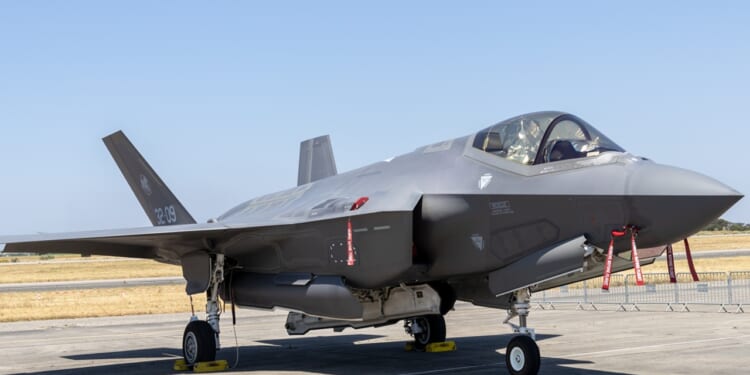After withdrawing from the F-35 program earlier this year, Portugal has solicited cheaper alternatives to replace its aging F-16 Fighting Falcons.
In August, NATO member Spain announced it was canceling the proposed acquisition of the Lockheed Martin F-35 Lightning II, stating it was instead considering the Eurofighter Typhoon while it remains part of the Franco-German-led Future Combat Air System (FCAS) program. There has since been speculation that Spain could also purchase the Dassault Rafale, as Rafales (unlike Typhoons) could operate from the deck of Spain’s multipurpose aircraft carrier/landing helicopter dock Juan Carlos I.
Even as Madrid has yet to finalize which aircraft it may purchase, Airbus is courting neighboring Portugal, which similarly bailed out of the F-35 program in March. Lisbon has been considering its options, including the Rafale and the Saab JAS 39 Gripen, to replace the Portuguese Air Force’s aging fleet of F-16A/B Fighting Falcons.
The Portuguese Air Force operates 21 frontline single-seat F-16As and four twin-seat F-16B trainers, with the aircraft ranging in age from 31 to 42 years.
The Lightning Struck Out—Twice—on the Iberian Peninsula
Until March, Portugal was among the NATO nations leaning towards adopting the F-35, joining the likes of Belgium, the Czech Republic, Denmark, Germany, Greece, Italy, the Netherlands, Norway, Poland, and the UK, which either operate or will operate the Lightning II in the coming decade. Non-NATO member Switzerland is also on track to receive the fifth-generation stealth fighter, with neighboring Austria now considering it as well.
However, Spain opted not to commit to the F-35, prioritizing its defense spending for European projects and reducing reliance on American military technology. Now, it seems Portugal is charting a similar course, with Lisbon expressing concerns about the United States’ commitment to NATO after President Donald Trump returned to the White House.
“There are several options that have to be considered, namely in the context of European production and also taking into account the return that these options may have for the Portuguese economy,” Portuguese Minister of Defense Nuno Melo told reporters in March.
Melo added, “We cannot ignore the geopolitical environment in our choices. The recent position of the United States, in the context of NATO and the international geostrategic plan, must make us think about the best options because the predictability of our allies is a greater asset to consider.”
Portugal Is Weighing Its Other Fighter Jet Options
Earlier this week, Airbus signed a memorandum of understanding with Portuguese Cluster for Aeronautics, Space and Defence Industries (AED), which could pave the way for a formal deal. That could include local production of the Eurofighter Typhoon, Flight Global reported.
“In a time where European sovereignty and industrial autonomy are at the forefront of our strategy, Airbus strongly believes that the Eurofighter is the best option for this replacement,” said Jose Luis de Miguel, head of the European region for Airbus Defence & Space.
The Portuguese Air Force currently operates 11 Airbus C295 military transports, of which five are configured for maritime patrol missions.
Nine countries across Europe currently operate the Eurofighter Typhoon, and NATO member Turkey has sought to become the 10th operator, acquiring new models but also some now in service with Qatar.
According to Flight Global, the multirole Typhoon is the most extensive single defense program in Europe, “employing 100,000 people across Germany, Italy, Spain and the UK. Airbus represents the German and Spanish portions of the consortium, with a combined 46 percent ownership.”
About the Author: Peter Suciu
Peter Suciu has contributed over 3,200 published pieces to more than four dozen magazines and websites over a 30-year career in journalism. He regularly writes about military hardware, firearms history, cybersecurity, politics, and international affairs. Peter is also a contributing writer for Forbes and Clearance Jobs. He is based in Michigan. You can follow him on Twitter: @PeterSuciu. You can email the author: [email protected].
Image: Shutterstock / fran_pt.

















